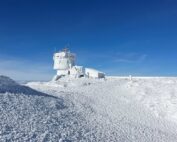All This Time
2011-12-14 21:58:30.000 – Mike Carmon, Weather Observer/Meteorologist
Marty splits the difference between EST and UTC
With regard to weather observations, according to the FMH-1 (Federal Meteorological Handbook-1):
‘The times that are disseminated as part of the observation shall be entered in UTC.’
This fact is confirmed by a header column of our station’s (KMWN’s) MF1M-10c, which is the form prescribed by the FMH-1 for taking surface weather observations.
As you may or may not be aware, all surface weather observations around the globe are taken according to UTC (Coordinated Universal Time), which is also known as Zulu (Z) or Greenwich Mean Time (GMT). The purpose of this is to ensure that all stations are taking observations at the same hour according to an identical clock, and a legitimate snap shot of current conditions can be formed by analyzing all concurrent weather observations. UTC does not change with the seasons as local time does with the daylight savings/standard swaps, so there is no confusion and no points of discontinuity in observation times. UTC is also a 24-hour clock, which eliminates the omnipresent AM/PM debacle.
For all of us east-coasters, UTC is local standard time (LST) plus 5 hours during the winter months, or local daylight time (LDT) plus 4 hours during the summer months. So when we perform an observation at 4:50AM EST and transmit to the National Weather Service, the time of the observation is officially reported as ‘0950Z’, which uses the brief symbol for zulu ‘Z.’ With the standardization of observation-taking time, one can then determine what was occurring at every other surface weather station at the same moment by referencing the 09XXZ observation for those stations.
Mike Carmon, Weather Observer/Meteorologist
Geologist Climbs Rock Pile, Looks Up
Geologist Climbs Rock Pile, Looks Up By Bailey Nordin Hello from the summit of Mount Washington! My name is Bailey Nordin, and I am the newest Weather Observer and Education Specialist joining the team
Life on Top of New England
Life on Top of New England By Anna Trujillo Hi everyone! My name is Anna Trujillo and I am one of the interns for the MWOBS winter season. I am super excited for the
I Haven’t Seen a Tree in 12 Days
I Haven’t Seen a Tree in 12 Days By Ryan Steinke A photo of me hiking Cathedral Ledge during my first off week. Hi everyone, my name is Ryan Steinke, and I






